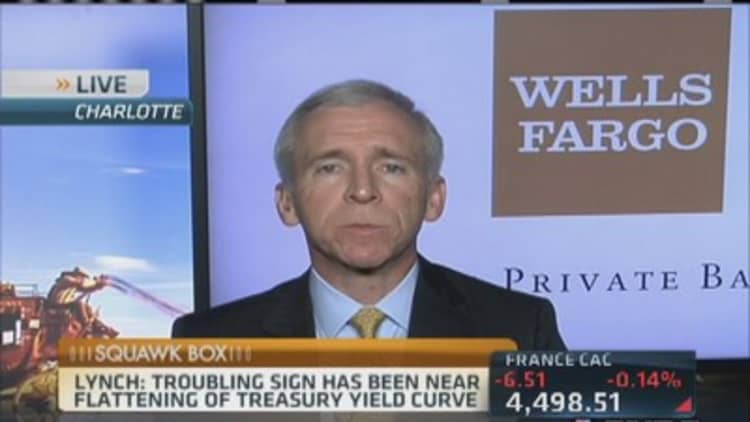
U.S. stocks declined on Wednesday, pausing after its advance into uncharted terrain, waiting for evidence that the economy has bounced back from a weather-plagued first quarter.
As the Dow and the S&P 500 on Wednesday came off record highs, the 10-year Treasury yield broke below a key support, viewed by some as signaling an economic slowdown and a reason to sell riskier assets.
The 10-year Treasury yield, used in figuring mortgage rates and other consumer loans, fell 6 basis points to 2.548 percent. It earlier hit a low of 2.5258, its lowest since Oct. 31.
"There is two-fold support, at 2.55 and 2.6, being tested today. Below that you can go back to secondary support at 2.4 percent," said Katie Stockton, chief technical strategist at BTIG.
"When I look at bond prices, there are some overbought readings that tell me they should start to stall here," Stockton added.
The 2.6 level is a "magic number for some, as it has been a risk-down, risk-off trigger. There are investors who sell stocks after it gets below 2.6 percent, as it's seen as predicting an economic slowdown," said Art Hogan, chief market strategist at Wunderlich Securities.
"We're going to give the market a chance here tomorrow with the data to get back on the winning streak and to new highs. So we'll be watching the cyclical numbers tomorrow, and want to see the spring rebound that (Federal Reserve Chair) Janet Yellen talked about," said Sean McCarthy, regional chief investment officer for Wells Fargo Private Bank.
Thursday's economic releases include data on industrial production, as well as regional gauges of business activity from the New York and Philadelphia Feds.
"We need a reason for the market to trade higher, and cyclical growth would be it. We're almost through earnings season, and looking for leadership. But it's got to be cyclical names and not defensive. It can't be utilities and health care, it's got to be industrials and technology," McCarthy added.
Deere declined after cutting its full-year revenue outlook; Sears Holdings turned lower after an initial jump after the department-store chain said it was exploring options including a possible sale for its stake in Sears Canada. Macy's also reversed course, falling after the retailer reported slightly better-than-expected earnings, but sales unexpectedly dropped. Shares of the New York Times dropped after the company said Jill Abramson, its executive editor, was unexpectedly leaving the position.
Major U.S. Indexes
After a five-session streak of gains, the Dow Jones Industrial Average declined as much as 120 points, and ended off 101.47 points, or 0.6 percent, at 16,613.97, with International Business Machines leading blue-chip losses.
The technology service company's chief financial officer told investors at a briefing that IBM is seeing challenges in its hardware business, but expects it to stabilize this year.
The shed 8.92 points, or 0.5 percent, to 1,888.53, with consumer discretionary falling hardest among its 10 sectors and telecommunications faring best.
Extending declines into a second session, the Nasdaq.dropped 29.54 points, or 0.7 percent, to 4,100.63.
The Russell 2000 fell 1.6 percent, leaving it off more than 9 percent from its intraday record high hit on March 4.
For every two shares rising, more than three fell on the New York Stock Exchange, where 620 million shares traded. Composite volume cleared 2.8 billion.
"Unless those cost increases can be passed on to the consumer, the increased costs are just a drag on earnings...not inflationary."Kevin Giddishead of fixed income capital markets, Raymond James

Ahead of the open, the government reported wholesale prices increased the most in more than a year in April, with producer prices up 0.6 percent in April, versus a 0.2 percent estimate.
"Unless those cost increases can be passed on to the consumer, the increased costs are just a drag on earnings...not inflationary," said Kevin Giddis, head of fixed income capital markets at Raymond James.
"While certainly different from consumer prices in terms of market reaction and Fed policy, we've now seen two months in a row of sharp gains in wholesale pricing that bears watching, especially in an environment where many don't think we have any inflation," offered Peter Boockvar, chief market analyst at the Lindsey Group.
"We need to see a modicum of inflation; I would love to see the hotter PPI translate into an uptick in the CPI," said Hogan.
The PPI report is the first of two this week that traders are watching for signs of inflation, with the Consumer Price Index slated for release on Thursday.
Applications for mortgages edged a bit higher last week, as rates fell to their lowest level since November, the Mortgage Bankers Association reported.
Read MoreDrop in rates spurs mortgage refinances
Investors also tracked events in Ukraine, where seven government soldiers were killed by pro-Russian rebels in an ambush in an eastern region on Tuesday.
The dollar fell against the currencies of major U.S. trading partners, while dollar-denominated commodities including oil and gold increased in price.
Gold prices gained $11.10 to $1,305.90 an ounce; crude futures rose 67 cents to $102.37 a barrel.
Read MoreWhy gold could struggle if CPI heats up
On Tuesday, The S&P climbed above 1,900 for the first time, but failed to close above the psychological level.
"Stocks reached record peaks once again on Tuesday supported by earnings statistics showing that among the 456 S&P 500 components that have so far delivered results, 76 percent beat forecasts for profits while 53 percent exceeded sales projections. Against that background, perhaps it's only fair that equities are putting in record highs," Andrew Wilkinson, chief market analyst at Interactive Brokers, wrote in emailed research.
| Factset Symbol | Name | Value |
| MKT.CVOL-BATY | BATY Composite Volume | 1745500000 |
| MKT.CVOL-BATS | BATS Composite Volume | 2200000 |
| MKT.CVOL-CBO | CBOE Composite Volume | 805500000 |
| MKT.CVOL-CHI | CHICAGO Composite Volume | 537100000 |
| MKT.CVOL-EDGX | EDGX Composite Volume | 1751400000 |
| MKT.CVOL-EDGA | EDGA Composite Volume | 1743400000 |
| MKT.CVOL-ADF | FINRA Composite Volume | 1753100000 |
| MKT.CVOL-BOS | NASDAQ OMX BX | 1740300000 |
| MKT.CVOL-PHL | NASDAQ OMX PSX | 1690100000 |
| MKT.CVOL-CIS | NATIONAL Composite Volume | 1607700000 |
| MKT.CVOL-NYS | NYSE Composite Volume | 2820200000 |
| MKT.CVOL-ASE | MYSE MKT Composite Volume | 85500000 |
| MKT.CVOL-PSE | NYSE ARCA Composite Volume | 730700000 |
| MKT.CVOL-NAS | NASDAQ Composite Volume | 1757000000 |
| MKT.CVOL-OTC | OTC BB Composit Volume | 227300000 |
| Total | 18997000000 | |
—By CNBC's Kate Gibson
Coming Up This Week:
Thursday
Earnings: Wal-Mart, Nordstrom, JC Penney, Kohl's, Vivendi, CA,Applied Materials, Flowers Foods, Advance Auto Parts
8:30 a.m.: Weekly jobless claims
8:30 a.m.: CPI
8:30 a.m.: Empire State survey
9:00 a.m.: TIC data
9:14 a.m.: Industrial production
10:00 a.m.: Philadelphia Fed survey
10:00 a.m.: NAHB survey
6:10 p.m.: Fed Chair Janet Yellen at US Chamber of Commerce on small business
Friday
8:30 a.m.: Housing starts
9:55 a.m.: Consumer sentiment
11:50 a.m.: St. Louis Fed President James Bullard
More From CNBC.com:


